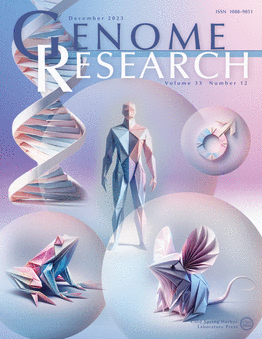Accurate short-read alignment through r-index-based pangenome indexing
IF 5.5
2区 生物学
Q1 BIOCHEMISTRY & MOLECULAR BIOLOGY
引用次数: 0
Abstract
Aligning to a linear reference genome can result in a higher percentage of reads going unmapped or being incorrectly mapped owing to variations not captured by the reference, otherwise known as reference bias. Recently, in efforts to mitigate reference bias, there has been a movement to switch to using pangenomes, a collection of genomes, as the reference. In this paper, we introduce Moni-align, the first short-read pangenome aligner built on the r-index, a variation of the classical FM-index that can index collections of genomes in O(r)-space, where r is the number of runs in the Burrows–Wheeler transform. Moni-align uses a seed-and-extend strategy for aligning reads, utilizing maximal exact matches as seeds, which can be efficiently obtained with the r-index. Using both simulated and real short-read data sets, we demonstrate that Moni-align achieves alignment accuracy comparable to vg map and vg giraffe, the leading pangenome aligners. Although currently best suited for aligning to localized pangenomes owing to computational constraints, Moni-align offers a robust foundation for future optimizations that could further broaden its applicability.通过基于r索引的泛基因组索引进行精确的短读比对
与线性参考基因组对齐可能会导致更高比例的读取未被绘制或由于未被参考捕获的变异而被错误绘制,也称为参考偏差。最近,为了减轻参考偏差,出现了一种转向使用泛基因组(一组基因组)作为参考的运动。在本文中,我们介绍了Moni-align,这是第一个基于r-index的短读泛基因组比对器,r-index是经典FM-index的一种变体,可以在O(r)-空间中对基因组集合进行比对,其中r是Burrows-Wheeler变换中的运行次数。Moni-align使用种子-扩展策略来对齐读取,利用最大精确匹配作为种子,这可以通过r-index有效地获得。使用模拟和真实的短读数据集,我们证明了Moni-align实现了与vg map和vg giraffe(领先的全基因组校准器)相当的校准精度。虽然由于计算限制,目前最适合对准局部泛基因组,但Moni-align为未来的优化提供了坚实的基础,可以进一步扩大其适用性。
本文章由计算机程序翻译,如有差异,请以英文原文为准。
求助全文
约1分钟内获得全文
求助全文
来源期刊

Genome research
生物-生化与分子生物学
CiteScore
12.40
自引率
1.40%
发文量
140
审稿时长
6 months
期刊介绍:
Launched in 1995, Genome Research is an international, continuously published, peer-reviewed journal that focuses on research that provides novel insights into the genome biology of all organisms, including advances in genomic medicine.
Among the topics considered by the journal are genome structure and function, comparative genomics, molecular evolution, genome-scale quantitative and population genetics, proteomics, epigenomics, and systems biology. The journal also features exciting gene discoveries and reports of cutting-edge computational biology and high-throughput methodologies.
New data in these areas are published as research papers, or methods and resource reports that provide novel information on technologies or tools that will be of interest to a broad readership. Complete data sets are presented electronically on the journal''s web site where appropriate. The journal also provides Reviews, Perspectives, and Insight/Outlook articles, which present commentary on the latest advances published both here and elsewhere, placing such progress in its broader biological context.
 求助内容:
求助内容: 应助结果提醒方式:
应助结果提醒方式:


